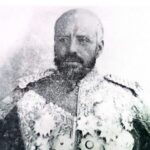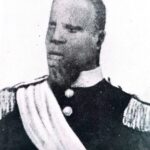HANFARI, MUHAMMED
- 2 Min Read
Muhammad Hanfari (18?-circa 1902) was the dominant leader of the southern Afar (Danakil), a namadic people inhabiting the Afar (Danakil) Desert of northeast Ethiopia, from about 1862 to 1902. His long and successful rule won him the nickname of IIeIta, “the river that flows endlessly.”
A member of the Modayite clan of the Asahimara confederation, he asserted authority over all the southern Afar, which at that time even included some Adohimara clans. He controlled the semi-desert land between the Red Sea port of Assab, and Bati, east of Dessye, in Wallo province, some 200 mi (320 km) to the southwest, and was the most important person among those competing for influence and trade in that area.
In 1875 Muhammad Hanfari defeated a continent of 400 Egyptians under the leadership of Werner Munzinger, allegedly out of loyalty to Negus Menilek II [reigned 1889-1913]. Muhammad allowed Menilek to import arms and ammunition through his territory, and protected his caravans. He also assisted Italians explorers and traders, who referred to him as the Sultan of Awsa. In 1888 it was probably his men who stopped an advanced party of armed Russians, two weeks before the French forced the entire Russian expedition to leave Sagalle.
Muhammad Hanfari successfully resisted occasional incursions from both highland and coastal tribes. But in 1895, before the battle of Adwa (1896), Ras Walda Giyorgis Abboye and Dajazmach Tassamma Nadaw were sent by Menilek to control the lowland population. The Afar resisted, but influenced by their seers, they refused to use firearms, and Muhammad warriors were consequently almost annihilated at the battle of Arado. Later, in 1896, Hanfari was appointed Dajazmach by Emperor Menilek. Muhammad died soon after appointing a nephew as his successor.
G. SAVARD




